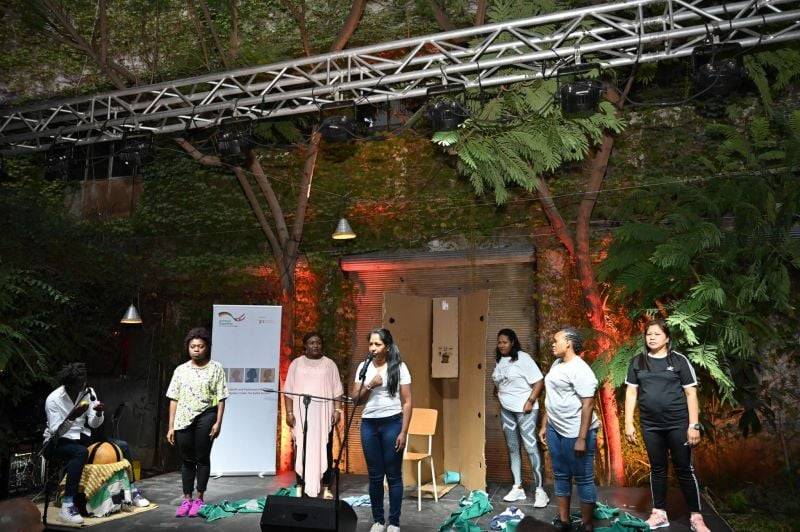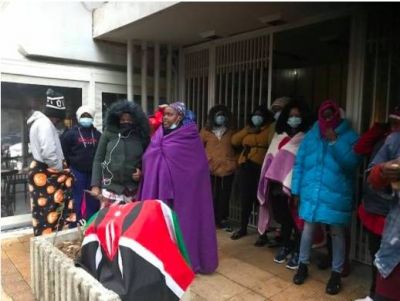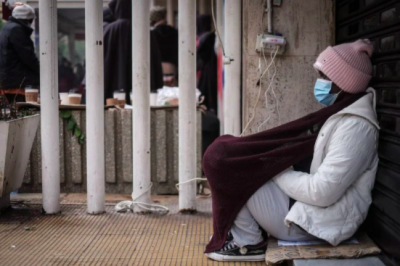
During the launch of the GIZ study, migrant domestic workers presented sketches describing their working conditions in Lebanon. (Courtesy of: GIZ)
“It’s hard when you come from countries like ours! I am here for the sake of my children. But it’s hard to stay healthy because I don’t have enough to eat,” one migrant worker in Lebanon told the German development agency GIZ in a recent report.
“I am unemployed and sick. I can’t go to the doctor's because I can’t afford it,” that same worker added. “I can’t even go to the hospital, because they will ask for my papers. People of color here have nowhere to go when they fall sick.”
According to testimonies gathered by GIZ in a report published last month, foreign domestic workers in Lebanon are particularly vulnerable amid the country’s economic crisis, leading to severe mental health impacts for some.
Such stress is particularly intense for those who have fled their employers’ homes, struggling to maintain their health and peace of mind as they do what they can to survive, the report added.
“In my country, my recruiter lied to me. At my bosses’, I was treated like a slave, not eating for two days in a row, sleeping in the basement,” one worker was quoted as saying.
That worker chose to leave, even if it meant leaving behind her personal documents, which had been confiscated by her employer. “It’s also hell to be unemployed. But in the end, you can manage to share a room and a bathroom with other migrants.”
Racism and discrimination
In Lebanon, domestic work is ignored by the labor law and governed by the kafala work sponsorship system, which makes foreign domestic workers vulnerable to abuses — such as being deprived of the right to terminate their work contracts in cases of mistreatment by employers.
Conducted by researchers Daryn Howland, Alena Mehlau and Philip Noun, the GIZ study was released in October at a ceremony attended by the German Ambassador to Lebanon, Andreas Kindl.
The study also highlights racism and discrimination faced by migrant workers in Lebanon from parts of Africa and Southeast Asia, including Ethiopia, the Philippines, Sri Lanka, Bangladesh, Sudan, Kenya and Nigeria.
“When an African woman walks around in shorts, she is immediately called a prostitute. A Lebanese woman wearing shorts will never be treated like that,” a Kenyan worker, speaking on condition of anonymity, told researchers.
She added, “We are accused of taking money away from the Lebanese. We are then told to go back home.”
Since 2019, Lebanon’s currency has collapsed, dropping to a record low of LL40,000 to the dollar in October.
For workers who live in their employers’ homes, their working conditions are reportedly often the cause of their anxiety.
“Stress comes from the work itself,” one worker told GIZ researchers. “We are paid a pittance.”
“We have to steal time to eat. So, we eat while working or in the bathroom. Because we have to finish our work and there is always a new job to do. Our days are so long,” she added.
Another worker said, “Our employers act as if they bought us. They threaten to return us because we are registered in their name.”
Since the onset of the economic crisis, the pandemic and the 2020 Beirut port explosion, many female migrant workers have left Lebanon.
Some of them packed their bags and left of their own free will Lebanon’s middle class lost their earnings, and amid the scarcity of foreign currency. Others left the country after being abandoned by their employers at the gates of their home countries’ embassies.
But, in the absence of any official figures, around 250,000 migrant domestic workers are employed in Lebanon, according to GIZ.
And while there are a number of men in the sector, most migrant domestic workers in Lebanon are women.
The feeling of being stuck
In this gloomy context, migrant women reported suffering from depression exacerbated by difficulty adapting to a new language and the Lebanese socio-political environment.
“I didn’t think Lebanon was so hard. I sank into depression. I lost my rights,” one migrant told GIZ.
For others, in a precarious situation, it is the fear of being thrown in prison that worries them most. After fleeing abusive employers, they risk prison because their status in Lebanon is illegal. They have few options for legal assistance.
“We have embassies. But they don’t care about us,” one respondent said.
What particularly worries these female workers is the guilt they were reported to feel towards their families in their home countries, for “not sending money sometimes,” for “not being there,” for “not loving them.”
The situations might differ. But one resounding theme throughout the report was that migrant domestic workers feel “stuck” in Lebanon because they often have “no choice.”
This article was first published in French in L'Orient-Le Jour. Translation by Sahar Ghoussoub.



